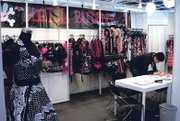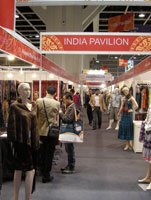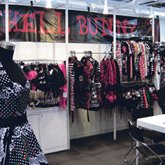Apparel and Retail Executives Look to China for Growth
HONG KONG—Step onto the balcony surrounding the Hong Kong Convention Centre and you’re greeted with a watery thoroughfare known as Victoria Harbour, where container ships ply the water with goods headed for overseas markets.
Beyond the harbor sits a chain of undulating mountains and mainland China, which fashion and retail executives believe is their new economic frontier waiting to be explored.
At the 41st edition of Hong Kong Fashion Week, held Jan. 18–21, the halls and conference rooms were abuzz with various companies’ expansion plans into China to tap the buying power of 1.3 billion residents.
Mango, the Spanish retailer that has aggressively moved into several major international markets with nearly 1,180 stores, is on track to open 100 stores in China this year, adding to its stable of 71 outlets already there. “The middle class in China is expected to rise to 100 million people” in the next five or six years, said Sujuan Liu, Mango’s business development manager for China. “We believe the market can absorb 10 times more stores than we have now. ... Expansion will be aggressive over the next five years.”
The financial push to Asia is being prompted by the long-term outlook in the industrialized countries where a recession beginning in late 2007 has led many retailers and apparel companies to either close their doors or re-evaluate their future.
Most industry observers expect Europe and the United States to see a slow and modest recovery as unemployment figures remain in double-digit territory this year and maybe into next.
While the United States has dug itself out of negative economic growth, China’s economic seams are bursting. The government there recently announced its fourth-quarter gross-domestic-product growth ballooned 10.7 percent from last year, one of the highest economic growth rates in the world.
“Mainland China is our target for business in the future,” said Vincent Fang, chief executive of The Toppy Group, a multi-billion-dollar apparel manufacturer and retailer in Hong Kong with more than 500 outlets under the nameplate Jessica, Episode, Colour Eighteen and Weekend Workshop. The brands have been popular in many Western countries such as Great Britain. “Our Chinese market should be up 10 to 15 percent this year, but our export market to the States will probably be up only 5 percent.”
Fang is not only expanding the Toppy retail empire into the Middle Kingdom but forming joint ventures with Western companies to help set up stores in major Chinese cities. The apparel executive is working with Italian companies Oviesse and Miss Sixty and British brand Pepe Jeans to launch their retail chains. Oviesse opened its first store right before Christmas in Shanghai with another 10 on the horizon. And Miss Sixty is shooting for 60 outlets in the next few years.
Vivienne Westwood, England’s iconoclastic designer who brought modern punk and new wave into the fashion mainstream, has an eye on China, too. The company already has 12 stores in Hong Kong, one in Macau and another in Shanghai. Andreas Kronthaler, the label’s creative director and Westwood’s husband, said China is definitely on the company radar. “It still can grow a lot for us because we just started,” he noted.
Kronthaler was at Hong Kong Fashion Week to coordinate the label’s first runway show there and help judge the Young Fashion Designer’s Contest. The winner received a three-month stint working with Westwood and her entourage in London.Exhibitors up
While the Chinese market was the talk of the town during the four-day trade show and fashion event, exhibitors representing mostly Chinese apparel factories and Hong Kong apparel and accessories ventures were scrambling for Western business. Nearly 2,000 exhibitors signed up for the Fall/Winter 2010 show, up 17 percent over last January, when the event was noticeably quieter.
However, U.S. buyers seemed to be rarer than normal. Shawn Far, president of U.S. Apparel Group in Los Angeles, attends Hong Kong Fashion Week every January and felt there weren’t as many buyers as in previous years. His theory was that many apparel executives probably opted to go to Bread & Butter in Berlin, a contemporary show held Jan. 20–22. “Prices are down here, but there is no newness,” said the L.A. executive, who has a license to produce Ed Hardy knits and jackets and makes his own label, Vertigo Paris.
He said he believes more buyers are going directly to China these days to find cheaper factories instead of stopping in Hong Kong. “I may not come back here next year and go to China directly, too,” he said.
Exhibitors were noticing a dearth of attendees. “There are very few American customers,” said Albert Guo of the Ningbo Hengdu Knitting Co. “I think it is due to the recovery.”
But David Weng, owner of Ningbo Top Import & Export Co., had gotten a few interested nibbles from retailers in Texas and Florida who were taken with his contemporary sweatshirts and T-shirts with unique prints and washes.
While basic garment factories and accessories houses filled several gargantuan halls at the event, one hall was reserved for World Boutique, a designer-label show that takes place every January during Hong Kong Fashion Week.
One corner of World Boutique was taken up by the brightly colored displays of rockabilly, punk rock, alternative and emo fashions. The exhibitors, organized by the alternative trade show Londonedge, had purple and pink hair, enough piercings to set off every metal detector within a 100-foot radius, and miles of tattoos. This was the first time an alternative-fashion group had exhibited in Hong Kong. Wendi McDowell of the Los Angeles label Lip Service and Kill City said things had been very slow. “People are interested but hesitant,” she noted.
Orders were slow in coming for Balraj Kudhaul, owner of Hell Bunny, a cute rockabilly line from London, who took a double-wide booth decorated with bright colors of fabric imprinted with bunnies gone bad. By the third day, he had only one order, which came from Australia. “We came out to support Londonedge,” he said. “But this is a lot like going out fishing. You can catch fish or you can come back with nothing.”
























